A developing medical school trend to ditch the Medical College Admission Test (MCAT) requirement may not bode well for the future of the profession, medical watchdog group Do No Harm told the Daily Caller News Foundation.
Approximately 40 medical schools across the country have dropped the MCAT, a multiple choice exam that determines an individual’s ability to problem solve, think critically, and understand concepts about medical study, as a requirement for some applying students, according to a list compiled by Inspira Advantage. Do No Harm alleged that dropping the requirement is another way schools aim to bolster diversity on campus but asserted that it is a “dangerous trend,” according to its analysis.
“The MCAT has been shown to predict who has the best chance to be successful in medical school,” Do No Harm Program Manager Laura Morgan told the DCNF. “Eliminating it removes a proven standard for schools to consider when admitting students who demonstrate the aptitude to be good doctors.”
The MCAT is developed and administered by the Association of American Medical Colleges (AAMC), according to its website. The association has pivoted to encouraging a holistic admission model that considers an applicants “experiences and attributes” alongside academic achievement and uses it as a factor on its Diversity, Inclusion, Culture and Equity inventory survey sent out to medical schools across the country to weigh their commitment to Diversity, Equity and Inclusion (DEI) practices.
“Standardized tests are backed by evidence and can be objectively evaluated. To conduct a ‘holistic review,’ some schools are requiring their admissions committee members to take training on how to evaluate applicants based on experiences and attributes,” Morgan told the DCNF, adding that the AAMC permits race and ethnicity to be used as an admission factor when it aligns with the school’s diversity-based mission and goals. “It’s not adequate because it is subjective, as opposed to standardized tests which are objective metrics.”
Javarro Russell, AAMC’s senior director of admissions testing services, told the DCNF that every “U.S. M.D.-granting medical schools require the MCAT exam” with some exceptions for alternative routes such as through joint BS/MD programs. Such programs are “designed for students to transition from an undergraduate to a medical degree through an eight-year commitment, according to Inspira Advantage.
“The MCAT exam was created with the input of medical schools for their use in the admissions process,” Russell explained. “The AAMC does not – and cannot – mandate if or how medical schools use the MCAT exam. Every medical school sets its own criteria for selecting the students who will contribute to its mission and successfully complete rigorous medical school curricula.”
One of the schools that does not require all applicants to submit an MCAT score is City University of New York (CUNY) School of Medicine, Do No Harm reported. A school representative said during a seminar about STEM and medicine that students accepted into its BS/MD program do not have the MCAT “to gatekeep them from going into medical school.”
At CUNY, the program takes seven years and aims to “increase the number of physicians of African-American, Hispanic and other ethnic backgrounds who have been historically under-represented in the medical profession and whose communities have been historically underserved by primary care practitioners,” according to its website.
The University of Pennsylvania’s School of Medicine exempted minority students from the MCAT if they complete a summer research program offered through five historically black colleges and universities. Exempted students must have maintained a 3.6-grade point average and showcase “character, leadership and motivation for a career in medicine.”
“Medical school admissions committees recognize that identifying and admitting students who have the potential to be good doctors requires more information than test scores, and consider the MCAT exam alongside the entire application to understand scores in context,” Russell told the DCNF. “Medical schools carefully consider each application using holistic admissions, considering the full range of each applicant’s background and portfolio.”
Our team is inspired by the strength and resolve of our members.
If you would like to submit a testimonial, click here: https://t.co/L1qdTbRxG1 pic.twitter.com/sycZFZlPeo
— Do No Harm (@donoharm) April 20, 2023
Dr. Stanely Goldfarb, Do No Harm chairman, has been aware of the growing trend of school’s dropping the MCAT requirement since before the launch of the watchdog group, Morgan told the DCNF. Goldfarb argued in a 2022 Newsweek op-ed that medical schools that opt to lower admission standards to boost diversity are putting students’ careers and patient wellbeing “at risk.”
“Rather than revisit the means by which they are pursuing diversity, however, the medical elite want to double down on their failing course,” Goldfarb wrote.
The U.S. Medical Licensing’s Step 1 exam, which is the first of three required for licensing, became pass/fail in January 2022, according to AAMC. Changing examination practices make it more difficult to determine whether graduates are prepared for their role in the medical field, Goldfarb argued.
“People of every race and background are fully capable of becoming world-class physicians. Medical schools should seek out the best candidates who are most likely to provide the best care for patients, regardless of what they look like or where they come from,” Goldfarb wrote. “Anything less jeopardizes the very purpose of these institutions. The medical elite may not want to admit it, but their current approach to achieving diversity has a steep cost, and it’s wrong to ask patients to pay it.”
The AAMC, CUNY School of Medicine and University of Pennsylvania’s School of Medicine did not immediately respond to the DCNF’s request for comment.
via wnd

